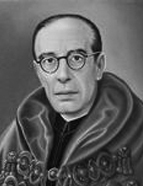

In the field of the history of medieval institutions, Paulo Merêa's work has made important contributions. Firstly, in the field of municipal institutions. Merêa believed that examining these institutions enabled the historian to "remain connected to the real and dynamic aspects of society" (Merêa, P. Estudos de História de Portugal, 2006, p. 439), in other words, in a way, real-world history. But this couldn't mean a narrowing of sources. He wrote that there shouldn't be an obsession with forals (which might not even be the most important sources). Similarly, studies should not focus on the judiciary, as "the concept of the municipality may have existed before the judiciary was established; moreover, it has been observed that small towns with a judge elected by the community were not always recognised as municipalities" (Idem, p. 440). However, Paulo Merêa's efforts in the historical investigation of institutions did not end with the municipalities. On the contrary, as A. M. Hespanha observed, Merêa conducted an in-depth study of the Portuguese feudal constitution — that is, the structure and organisation of medieval institutions in Portugal. The results of this work are summarised in the História de Portugal led by Damião Peres, in the chapter entitled “Organização social e administração pública” [Social organisation and public administration].
The last phase of Paulo Merêa's work was devoted to the study of legal education in Portugal from the end of the Modern Period to the beginning of the 20th century, these works were collected by the Imprensa Nacional (Merêa, P., Estudos de História do Ensino Jurídico... [Studies on the History of Legal Education...], 2005. The latter part of his work can be divided into two large groups. First, from 1947 to 1957, he developed a historiographical perspective on the teaching of law and on the Faculty of Law itself, with particular emphasis on the post-Pombaline period and the early 19 th century (times when major changes occurred in legal education in Portugal). Then, from 1957 to 1970, he focused on more prosopographical aspects of legal education, including lists of Professors and brief biographies. Most of these texts were published in various issues of the Boletim da Faculdade de Direito [Bulletin of the Faculty of Law]. But there were a few exceptions, such as the chapter “O Ensino do Direito em Portugal de 1805 a 1836” [The Teaching of Law in Portugal from 1805 to 1836], which was chapter number II of vol. I of Jurisconsultos Portugueses do Século XIX , published by the General Council of the Portuguese Bar Association. The “Esboço de uma história da Faculdade de Direito” [Outline of a history of the Faculty of Law], published in separate issues of Boletim da Faculdade de Direito, was also written to be expanded on a possible vol. II of this work, which was never published (a second volume was published, a continuation of part 2 of vol. 1, but vol. 2 was not originally planned, which would cover the creation of the Faculty of Law) (Merêa, P., Estudos de História do Ensino Jurídico..., 2005, p. 106).
This work is financed by national funds through FCT - Foundation for Science and Technology, I.P, in the scope of the projects UIDB/04311/2020 and UIDP/04311/2020.
